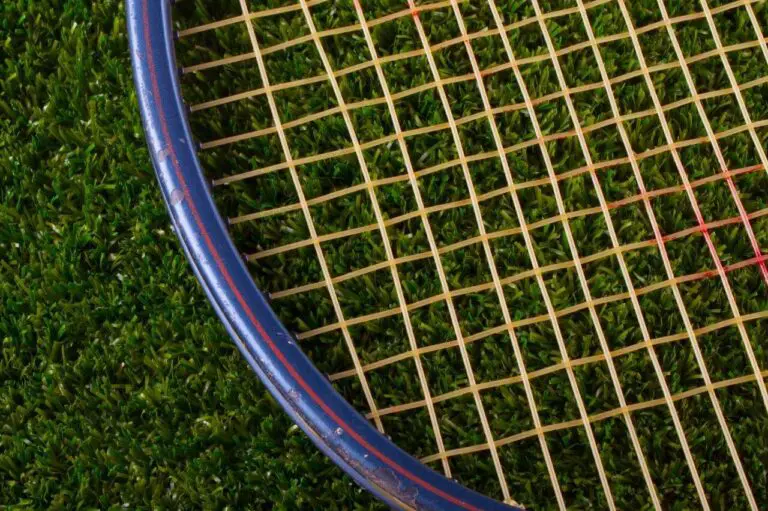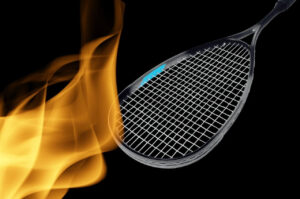How do tennis rackets crack? well, tennis rackets are subjected to a great deal of stress during play.
This can cause the racket frame to crack, which can be dangerous for the player.
In this article, we will explore the various ways that tennis rackets can crack and what you can do to prevent it from happening.
What are the various ways that tennis rackets can crack?
There are a few different ways that tennis rackets can crack:
-The most common way is from tension. When the strings are tightened too much, it can put undue stress on the frame and cause it to crack.
-Another common way tennis rackets crack is from impact, either from the ball or from hitting the ground. This can cause the frame to crack, which can be dangerous for the player.
-Tennis rackets can also crack from exposure to heat or cold. If the racket is left in direct sunlight or a very cold environment for too long, it can cause the frame to crack.
-If the grommets, which are the small plastic rings that hold the strings in place, break, it can cause the racket to crack.
-If a string snaps and is not replaced, it can cause the racket to crack, it can cause the racket to crack.
-If your racket clashes with your partner’s racket while you and he play doubles, it can cause the racket to crack.
-Using an old or damaged racket. Sometimes, tennis rackets are simply defective and will crack easily. If you have a racket that cracks frequently, you may want to consider replacing it.

What can you do to prevent your tennis racket from cracking?
There are several things you can do to prevent your tennis racket from cracking:
-Be careful not to over-tighten the strings. This can put undue stress on the frame and cause it to crack.
-Re-strung a racquet as often as necessary based on how frequently you play weekly (at least twice per year). This will guarantee a good level of performance, and prevent your tennis racket frame from cracking.
-Replace snapped strings immediately.
-Avoid hitting the ground with your racket.
-Keep your racket out of direct sunlight or extreme cold.
-Never store your racket in a car trunk or in any other area that is exposed to high levels of heat or humidity.
-Wrap your racket in a soft cloth after each use or cover it with a racket bag when not in use.
-Replace the grommets regularly. This will ensure that the strings are properly held in place and prevent the racket from cracking.
-Be careful not to clash rackets with your partner during doubles play.
-Inspect your racket regularly for any cracks or damage. If you see any damage, have the racket repaired or replaced immediately.
-If your racket frequently cracks, consider replacing it. A defective racket is more likely to break and can be dangerous.
We hope you found this article helpful. Tennis rackets are a big investment, and you want to make sure that yours lasts as long as possible. By following the tips above, you can help to prevent your racket from cracking.
Can you fix a cracked tennis racket?
If you have a cracked tennis racket, you may be wondering if it can be fixed.
A long-term repair to restore the frame’s structural integrity is not possible. However, you may be able to temporarily fix the racket with a patch or butt cap replacement. until you can buy a new tennis racket.
If you have a cracked tennis racket, it is important to take it to a qualified racket technician for an assessment.
He will be able to tell you if a temporary fix is possible and advise you on the best course of action.
How long should tennis rackets last?
Tennis rackets generally last between 1 and 10 years.
The lifespan of a tennis racket depends on several factors, including how often you play, how hard you hit the ball, and how well you take care of your racket.
If you are a big hitter who plays frequently and plays tournaments, you can expect to replace your racket every 1 year.
If you are a club player who hits the ball less hard and takes good care of your racket, your racket can last 10 years or more.
Do tennis rackets degrade over time?
Yes, tennis rackets do degrade over time.
The reason for this is that the materials that they are made out of start to break down the moment you first string them.
This may surprise some people since many racquets are constructed of materials identical to those used by NASA.
Why do tennis players break their rackets?
There are a few reasons why tennis players break their rackets:
-Release of tension: Sometimes players will break their rackets as a release of tension. This can help allow them to refocus and play better.
-Anger: One of the most common reasons that players break their rackets is out of anger. This usually happens after a player has made a mistake or lost a point.
-Frustration: Another common reason for racket smashing is frustration. This can happen when a player is struggling to play well or when they are not able to hit the ball the way they want to.
-Nervousness: Some players get very nervous during matches, and this can lead to them breaking their rackets.
While breaking a racket can sometimes be helpful for a player, it is important to note that it can also be harmful.
Racket smashing can damage the court, and it can also injure other players or spectators if they are hit by a flying piece of the racket.
It is important to only break a racket if you are sure that you will not harm anyone or anything.
In conclusion
While tennis rackets are designed to be durable, they can still crack or break.
This can be due to factors such as hitting the ball too hard, using an old or damaged racket, or simply accidents (other factors are in this guide above).
If your racket does crack, it is important to take it to a qualified technician for assessment.
A temporary fix may be possible, but usually, a new racket will need to be purchased.
Tennis rackets generally last between 1 and 10 years, depending on how often you play and how well you take care of your racket.
Do note that racket smashing can be harmful to people and property, so only do it if you are sure that nobody will be hurt.
I hope you enjoyed learning about How do tennis rackets crack?
Stay tuned for more posts about interesting topics in the world of tennis rackets!
Do you have any questions or comments about How do tennis rackets crack? Let me know in the comments below!
Be careful with your tennis racket and thanks for reading! 🙂








